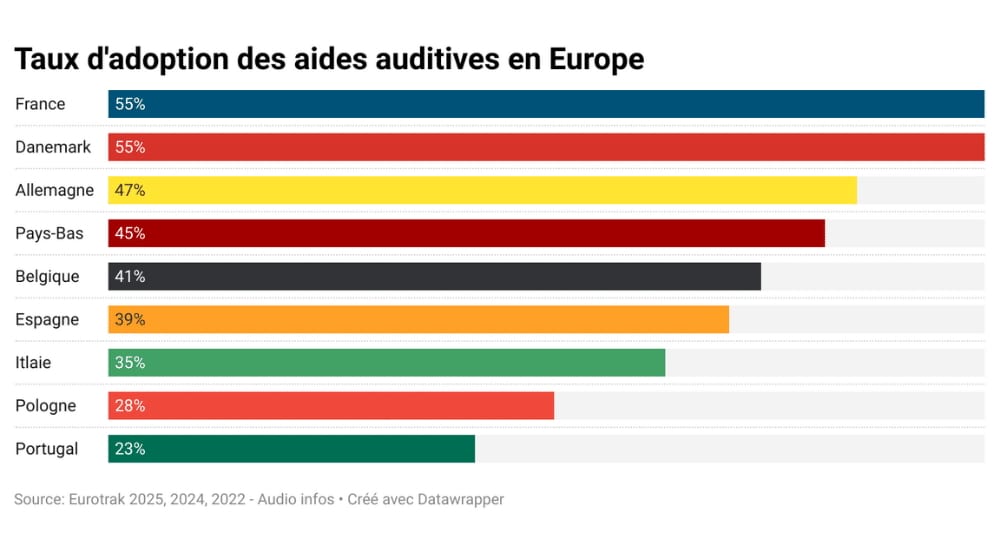Study: hearing aids may help people live longer
A credible study that suggests that consistent use of hearing aids might contribute to a lower mortality risk is what both the audiology industry and profession would have put high on their wishlists to wake up to in January 2024. Published in the Lancet Healthy Longevity journal, this US research by Dr. Janet S. Choi and colleagues has proved its pinch-punch factor through widespread media coverage.

Although previous studies of hearing aid use and reduced mortality have produced mixed results, several concluding that aids offered no protective effects, this latest study has robust elements, notably eschewing self-reporting – which introduces possibility of bias – in favour of objective audiometric testing by trained examiners based on the established NHANES protocols. The study also has a long follow-up period – ten years – and evaluation of hearing aid compliance, as hearing aid use rates are typically low.
Method
Using US data from the National Health and Nutrition Examination Survey between 1999-2012, the researchers from Keck Medicine of the University of Southern California identified 9,885 adults of 20 years and older who had had hearing evaluations, and who filled out questionnaires about their hearing aid use.
In a cross-sectional, follow-up study, a total of 1,863 adults were identified as having hearing loss, of whom 237 reported using hearing aids at least once a week; for at least five hours per week; or at least half the time, usually, or always (vs seldom or never). Never-users of aids numbered 1,483.
Discussion of results – 24% lower risk of mortality among regular hearing aid users
Importantly, the authors note that audiometry-measured hearing loss was associated in the cohort with an increased risk of all-cause mortality; the more severe the level of loss, the higher the risk of mortality.
Among individuals with hearing loss, the risk of mortality was found to be lower among regular hearing aid users than never-users in multivariable models accounting for levels of hearing loss, demographics, and medical history.
“We found that adults with hearing loss who regularly used hearing aids had a 24% lower risk of mortality than those who never wore them,” said otolaryngologist Janet S. Choi, lead researcher of the study. “These results are exciting because they suggest that hearing aids may play a protective role in people’s health and prevent early death.”
Loneliness, depression,…
Interestingly, the authors comment on areas which the hearing health community is currently intensely focusing on, not least because of ongoing research into factors contributing to cognitive decline, such as loneliness, social isolation, and depression. The positive effect of hearing aids on these situations could have contributed to the lowered mortality risk, they point out.
The discussion is continued as an editiorial in the January issue of The Lancet Healthy Longevity . The writers stress the need for further studies and randomised controlled trials, as indeed do the authors of the actual research.The Lancet article suggests that evaluating the effects of hearing aids in a high-risk population might better identify the protective effect of hearing aids, an objecive that a clinical trial among individuals at greater risk of decline and morality – those with pre-existing cognitive decline or poor physical health – might enable.
What might the mechanism be?
A study of such promise for those who market hearing devices – and those who fit and sell them – will inevitably become hot currency in the push to get hearing aids to help an increasing number of the estimated 1.6 billion people globally who suffer from hearing loss, a figure projected to increase to 2.5 billion by 2050. But for the findings to be absolutely legitimate tender, the mechanism behind the association between hearing aids and reduced mortality needs to be clarified. The aforementioned Lancet article stresses that “it is possible that individuals with access to hearing care are healthier and have a higher socioeconomic status, which are factors that might be independently associated with reduced risk of mortality.”
And the authors underline that “given the consistent links between hearing loss and cognitive decline, another plausible explanation for this association is that hearing aids improve mortality risk by reducing the risk of dementia.” Here, they mention that the recently published, ACHIEVE trial “found that hearing aids did not reduce 3-year cognitive decline”.
Hearing treatment, however, “might improve mortality risk by improving loneliness, depression, and frailty, all of which are risk factors for poor health”, the article suggests.
Source: Lancet Healthy Longevity


